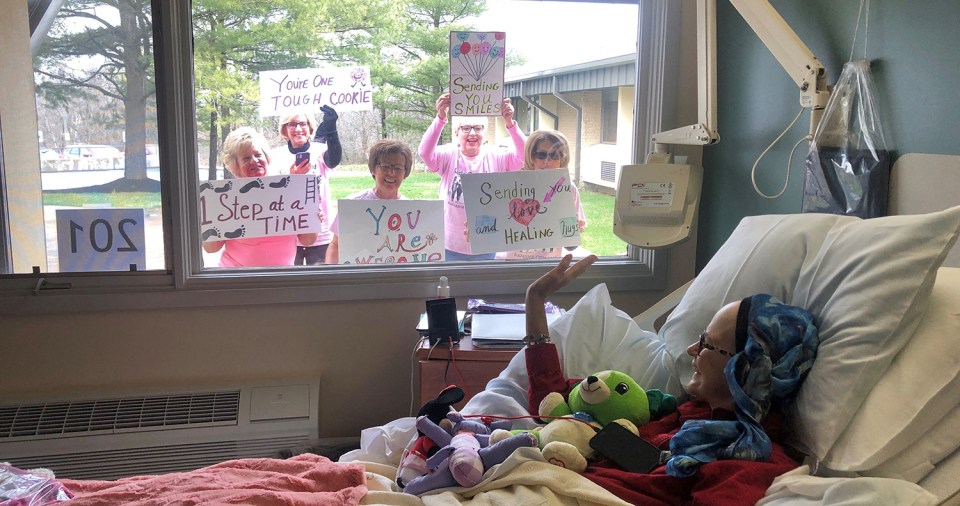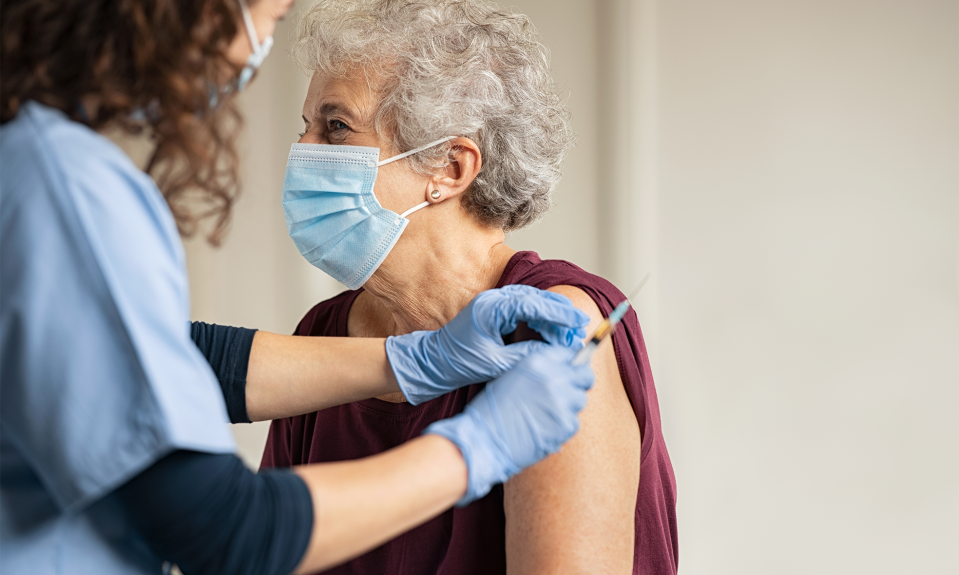Brenda Stover of Aaronsburg, Pennsylvania is a fighter, and she isn’t going to let a stroke or COVID-19 get in the way of her pancreatic cancer battle and getting back home.
Stover was halfway through chemo treatments for pancreatic cancer, when she had an embolic stroke. While the stroke had minimal effects on her speech and cognition, it caused the entire left side of her body to become weak.
While fears of COVID-19 are leading many to avoid time in the hospital, Stover knew that inpatient rehabilitation would help her regain strength and function of her arm and leg.
“Ms. Stover was so motivated to improve and had such a great attitude considering everything she was going through,” said Bre Tressler, one of Stover’s occupational therapists.
She was admitted to Encompass Health Rehabilitation Hospital of Nittany Valley shortly after visitor restrictions were put in place due to the coronavirus pandemic. Despite the restrictions, Stover had a support system cheering her on during her stay, whether it was her care team inside the hospital or her family and friends outside.
“No matter what was thrown Brenda’s way—and believe me it was a lot—she met the challenge with a smile and unmatched determination,” said Abbie Doberstein, one of Stover’s physical therapists at Encompass Health Nittany Valley. “We challenged her with something one day, and she was so driven and competitive with herself that she conquered it in no time.”
Signs of progress
When admitted to Encompass Health Nittany Valley, the therapy team used a variety of techniques and technologies to help her learn to mobilize, transfer and perform self-care activities.
“When she first started with us, we worked on her core, sitting balance, and transfers,” said Jen Mckernan, a physical therapist on Stover’s care team. “Then we progressed her to standing weight-bearing activities and lower extremity exercises and also walking with our AutoAmbulator.”
The AutoAmbulator, a body-weight supported treadmill training technology that reproduces a walking pattern for the patient, was used in her gait training and was also a way that Stover could measure her personal success. On the first day using the AutoAmbulator, she recalls taking 523 steps with the technology’s assistance and was excited when she progressed to 726 steps three days later.
Stover also remembers the moment she felt movement again in one of her affected limbs.
In a different therapy activity, Stover would lay on her back on a mat and make a back and forth motion with a roller skate on her left foot on the mat. When she first performed the exercise, the therapy team helped her do the back and forth motion. Then, the following week, Stover repeated the activity and was able to control the movement on her own.
“I don’t think there was a dry eye in the gym the first day she was able to move her left leg in a session with her primary physical therapist,” Doberstein said. “When patients realize they are regaining function or getting closer to fulfilling the roles that are important to them—in Brenda’s case mother, wife, teacher, friend, coworker/employee and world traveler just to name a few—it is the single best thing that keeps reminding me that I love what I do.”
A strong support network
Aside from her nursing and therapy teams, Stover had many others cheering her through her recovery.
“Her wonderful support system really helped her stay positive and was very supportive considering the circumstances of COVID-19,” Tressler said.
Stover’s strong support system includes her husband, who she affectionately calls her “rock,” her large family and a special group of girlfriends made up of childhood friends and her sister-in-law, who made sure Stover knew she wasn’t going through this alone.
Since she couldn’t have visitors, her girlfriends got creative and surprised Stover outside of the window of her hospital room while donning T-shirts from a girls’ trip they took to Panama City, Florida, and holding signs with supportive messages.
“I was really taken by surprise,” Stover said. “It was a really sweet thing for them to do.”
The next steps
Stover is excited to return to a more regular routine. She’s hoping to become more independent through additional in-home therapy and return to those activities she enjoyed most before her stroke.
Most importantly, Stover is ready to get back on track so she can tackle her initial battle. “I’m ready to beat cancer.”
The content of this site is for informational purposes only and should not be taken as professional medical advice. Always seek the advice of your physician or other qualified healthcare provider with any questions you may have regarding any medical conditions or treatments.


